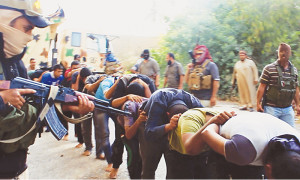
Now it has finally become clear that a total of 10 thousand militants of the ISIS was joined by a number of Sunni tribes irritated with the Shi’ite Prime Minister Nouri al-Maliki’s policies along with hundreds of soldiers from the former army of Saddam Hussein, the members of the Ba’athist movement headed by Hussein’s former second in command Izzat Ibrahim al-Douri, as well as a number of small terrorist groups, such as the Mujahideen Army. The number of Sunni militants assembled under the banners of the ISIS totals to 35 thousand people. The Islamic State of Iraq and Syria is now by headed Abu Bakr al-Baghdadi, who is considered an extremely experienced field commander.
Iraqi Prime Minister Nouri al-Maliki called on June 18 on Sunni tribes that support the actions of the ISIS for them to “disassociate themselves from criminals working for the foreign forces.” Additionally the Prime Minister has fired several high-ranking officers for their failure to stop the advance of Sunni insurgents. In one of his statements Nouri al-Maliki said that all that had been happening in Iraq lately was nothing but a conspiracy of regional forces, supported by some Iraqi politicians. On June 17 Iraqi Prime Minister in his harsh manner accused Saudi Arabia of helping the ISIS. In particular, he accused Riyadh of financial and moral support it had been providing to the terrorist groups and then put the responsibility for mass killings of the Iraqi population on Saudi authorities. Moreover, Baghdad advised Saudi Arabia “to focus on its domestic issues in order to make sure that there would be no discrimination in the kingdom”. “This is the best advice Iraq, which is undergoing democratic transformations and which has held democratic elections can give to Saudi Arabia,” – said Nouri al-Maliki in a statement. In return, Saudi Arabia accused Iraqi Prime Minister of carrying out an inadequate policies against the Sunni part of the population which, according to the Riyadh, has put Iraq on the brink of disaster. The Saudi kingdom has also called on Baghdad to immediately form a government of national unity in order to end the crisis.
This week the rebels were able to capture more territory, including the province of Nineveh with the second most important city of Iraq – Mosul, part of the province of Salah ad Din with the city of Tikrit, as well as most of the Diyala province with the city of Baquba. The Islamists are planning to establish the Shariah law on the occupied territories, they are carrying killings of the local population en masse, as well as demonstrative executions of captured soldiers. Thousands of local residents were forced to flee. To keep the situation from further deterioration, the United States and Iran decided to provide assistance to the official Iraqi government. A commander of an elite unit Qods of the Iranian Islamic Revolutionary Guard Corps Qasem Soleimani has recently arrived to Baghdad, he is going to take command of the defense of Baghdad, Najaf and Karbala, where the better part of Shiite shrines are situated, additionally he is going to coordinate the actions of the Shiite militia with Iraqi army. As for the Americans, their combat planes on June 19 began patrolling Iraqi airspace. They’ve brought F-18 aircraft to carry out this mission. Earlier, the New York Times, citing sources in the governments of both countries reported that the Iraqi authorities have repeatedly appealed to Washington for it to launch air strikes against militant camps, but received no positive answer. So the US is still being gradually drawn into a military conflict in Iraq, and how it would end nobody can tell.
Apparently, Washington has finally realized that the current deterioration of the situation in Iraq will lead to the subsequent collapse of the region as a whole and then the entire security of the West will be put in dire straits. Under these conditions, the crisis in Ukraine should be of secondary importance for the White House. Oil prices have risen sharply, the gas prices are about to rise in the nearest future. And this is nothing but a direct threat to the economies of the US, EU and Japan. We must remember that Iraq and Iran were going to reach the level of oil exports of 20 million barrels a day by 2020, which would have substantially reduced world oil prices and make Saudi Arabia’s business unprofitable. Therefore, it is likely that Riyadh will continue its support of the Sunni movement in Iraq. Baghdad has already reached the level of oil exports to 4.5 mln b/d, and two years later went to the 6 mln b/d Now, when Iraq is swept away by a full scale war that is threatening its oil infrastructure, the CCG can finally be calm. But Riyadh is extremely worried about something else – the US military cooperation with Iran in the Iraqi conflict. Almost all analysts believe that in order to provide military aid to Baghdad, Washington will have to make concessions to Tehran in the negotiations on the nuclear program and the withdrawal of sanctions that had been earlier imposed by the West. And Iran — is the principal rival of the Saudi Arabia and Arab monarchies of the Gulf in the Middle East.
But there is little left to say. Now that Washington itself has released the genie out of the bottle, by creating the Arab Spring movements that destroyed the secular Arab regimes and spawned the most radical Islamism. And now this monster is out of control of the US “teachers”. All there’s left is to sit an wait for even more political turmoil in the Middle East.
Alexander Orlov, political scientist, expert in Oriental Studies, exclusively for the online magazine “New Eastern Outlook”.
